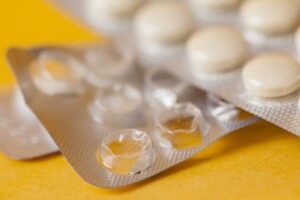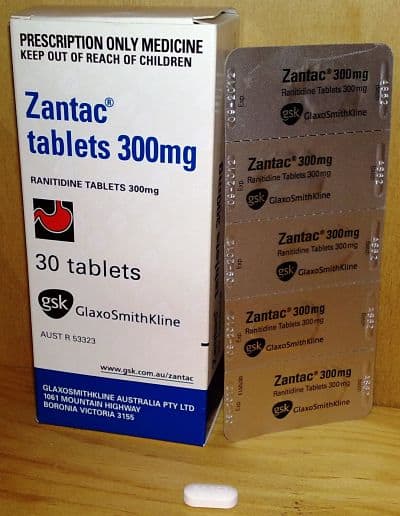 Pharmaceutical manufacturer GlaxoSmithKline (GSK) is recalling the popular heartburn drug Zantac in all markets as a “precaution,” just days after the Food and Drug Administration (FDA) found “unacceptable” levels of a probable cancer-causing impurity known as N-Nitrosodimethylamine (NDMA).
Pharmaceutical manufacturer GlaxoSmithKline (GSK) is recalling the popular heartburn drug Zantac in all markets as a “precaution,” just days after the Food and Drug Administration (FDA) found “unacceptable” levels of a probable cancer-causing impurity known as N-Nitrosodimethylamine (NDMA).
Zantac May Contain High Levels of NDMA
On October 8, 2019, GSK said it was recalling four prescription-only Zantac medications, including tablets of 150- and 300-milligram dosages, an injectable drug, and a syrup version. Over-the-counter 75-milligram-dosage Zantac products are made by a different company and are not affected by the recall.
NDMA is a semi-volatile organic chemical that is a byproduct of several industrial processes and can be present at very low levels in certain foods. It is toxic to the liver and other organs and a probable carcinogen in humans.
Last month, American and European health officials announced that they were reviewing the safety of ranitidine – the active ingredient in Zantac – after the online pharmacy Valisure flagged the impurities. The FDA said Valisure’s higher-temperature testing method had generated very high levels of NDMA from ranitidine-containing drugs. NDMA had previously been found in some blood pressure medications, many of them containing valsartan, that are part of a class of drugs known as Angiotensin II Receptor Blockers, or ARBs.
After checking the over-the-counter drugs using a low-heat method of testing, the FDA said it found much lower levels of NDMA than was discovered by Valisure. The agency has asked ranitidine manufacturers to conduct their own testing to determine NDMA levels and to send samples of their products for testing. Health officials say the impurity appears to have been introduced by changes in the manufacturing process.
Others Taking Action on Ranitidine
GSK is not the first to take action in light of recent concerns about the safety of ranitidine. Last month, Swiss drug manufacturer Novartis stopped the global distribution of its ranitidine products. Canadian health authorities have also asked makers of the drugs to halt distribution while they gather more information about the health risks.
Additionally, Hong Kong regulators have recalled four ranitidine drugs, while thirteen products containing ranitidine have been pulled in Ireland. Meanwhile, American pharmacy chains such as Walmart, CVS, Walgreens, and Rite Aid have suspended the sale of over-the-counter heartburn drugs containing ranitidine.
What Do I Do If I Have Been Injured by a Dangerous Drug?
The drug industry is one of the biggest in the world. In fact, the worldwide market for pharmaceuticals reached a record $1.2 trillion in sales in 2018, up by $100 billion from the previous year. And it is only expected to keep growing, with estimated annual sales of $1.5 trillion by 2023. The sheer magnitude of the pharmaceutical industry is understandable. With the average life expectancy on the rise, people are more likely than previous generations to live long enough to face serious medical events and chronic illnesses that require drug treatment.
These drugs are largely effective, further driving up the length and quality of people’s lives, but they are not without their risks. Unfortunately, the amount of money on the line can incentivize drug companies to rush their products to market before confirming they are safe, often with harmful, even deadly results to the consumer.
When this happens, you need somebody who can fight for you against the multi-billion-dollar pharmaceutical giants, somebody like GWC Injury Lawyers, one of the premier Personal Injury and Workers’ Compensation law firms in Illinois.
Our dedicated Chicago personal injury attorneys have extensive experience in dangerous drug litigation. With more than $2 billion recovered for our clients over more than four decades in the business, GWC has the resources, the dedication, and the fearsome reputation both inside and outside of the courtroom that you need to help get you and your family the justice you deserve.
If you have been wrongfully injured by a dangerous drug, contact GWC today to schedule a free, no-obligation consultation with one of our lawyers. Call our office at (312) 464-1234 or click here to chat with a representative at any time.
<< BACK TO BLOG POSTS